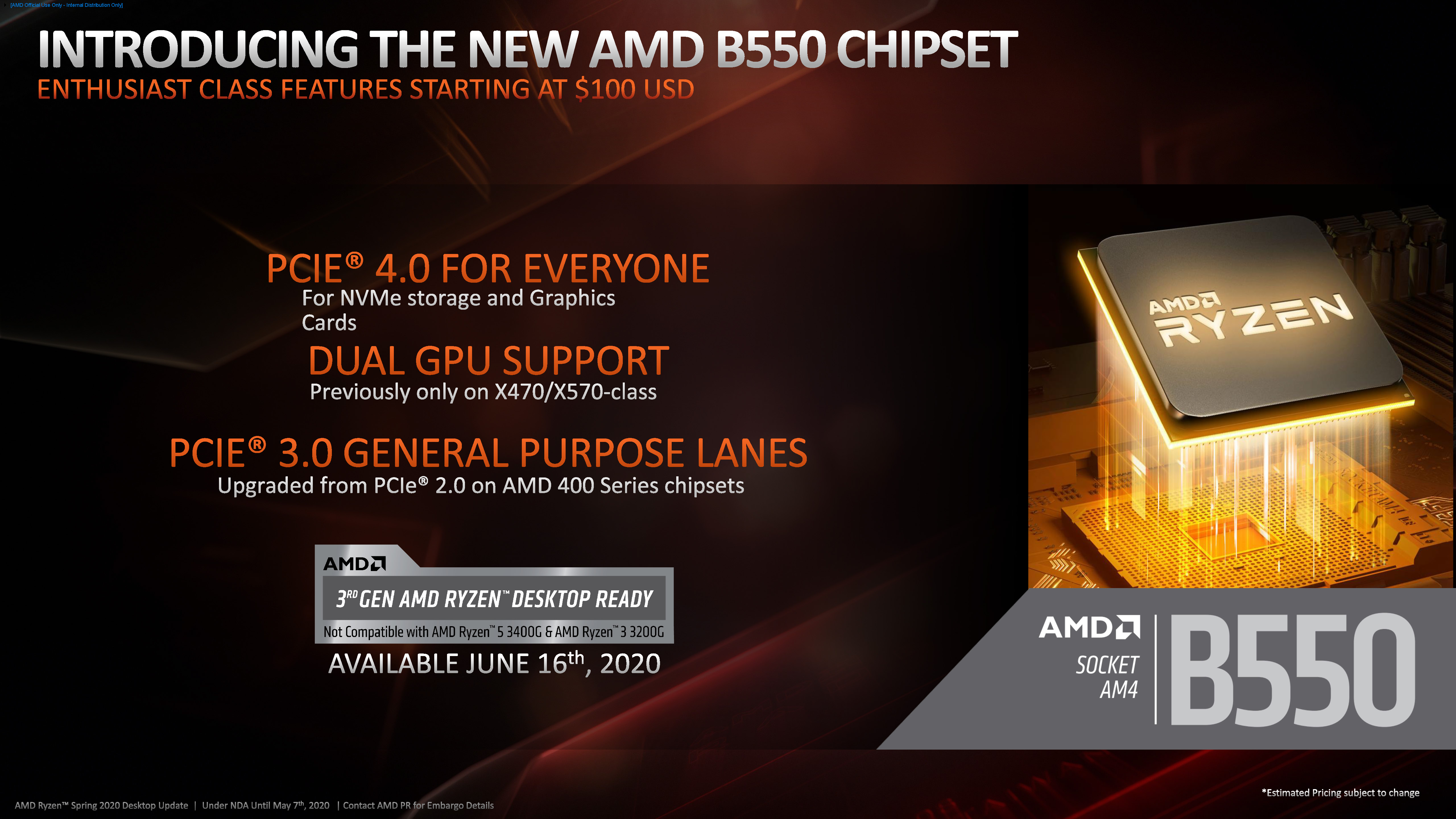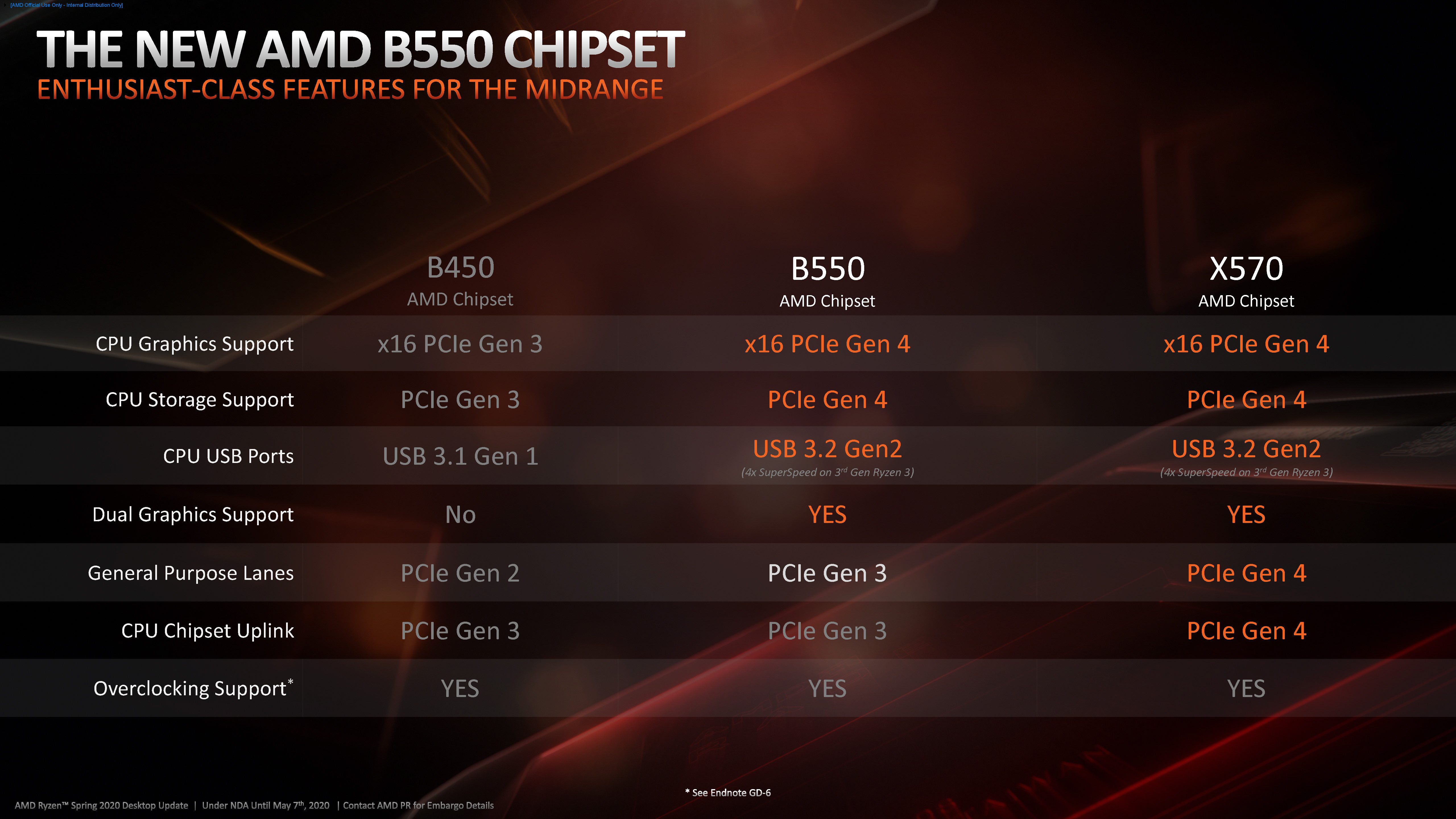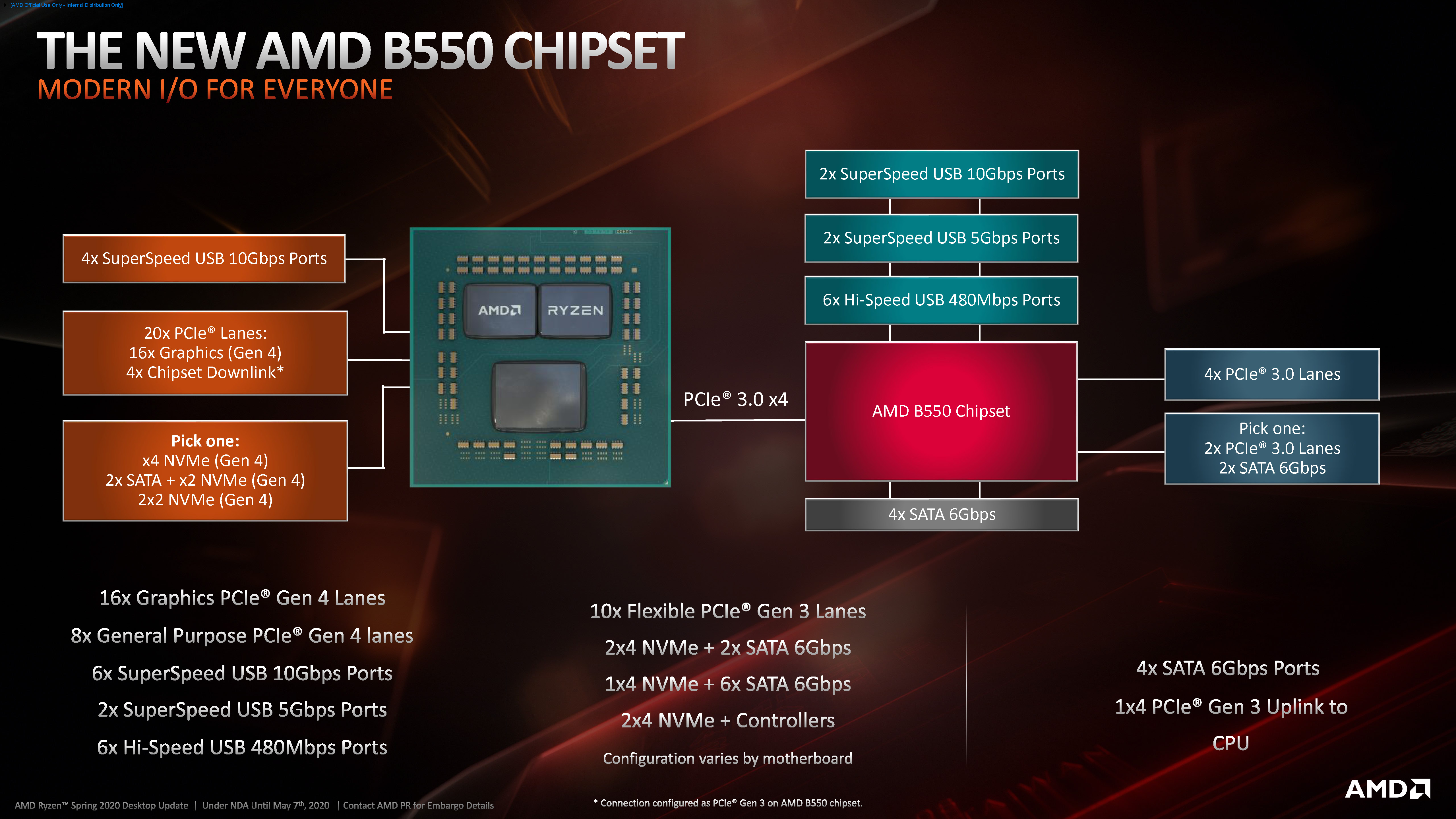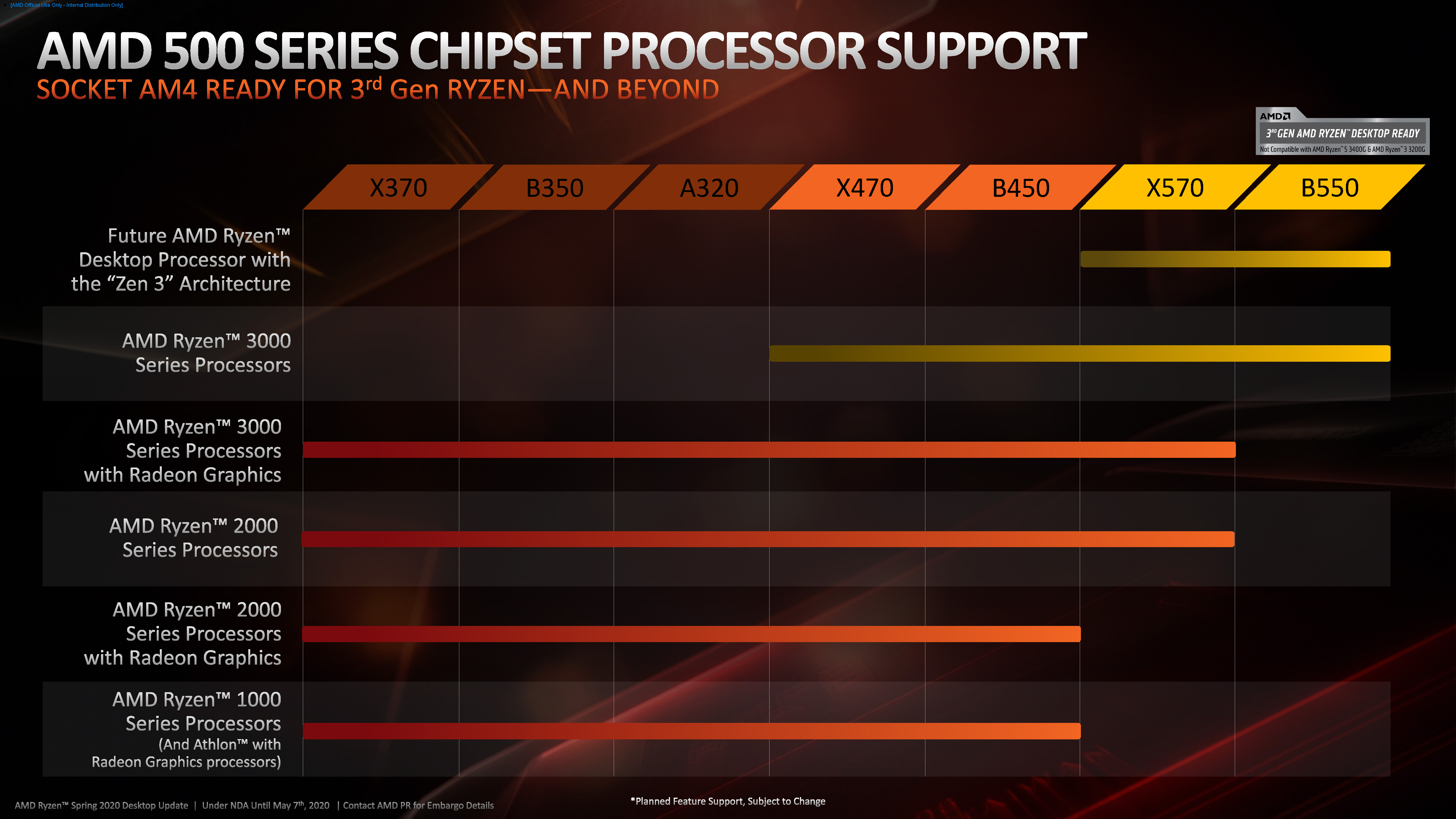AMD Confirms Zen 3 Compatibility on B550, X570 Motherboards
AMD revealed more information on the budget B550 chipset today. In the process, the chipmaker confirmed that when its CPUs based on the Zen 3 microarchitecture arrive, they'll work flawlessly on X570 and B550 motherboards with just a simple firmware update.
The B550 chipset will be consumers' cheapest ticket to PCIe 4.0. The motherboards will bring PCIe 4.0 functionality where it matters most, on the primary PCIe slot and M.2 slot. The current AMD Ryzen 3000-series desktop CPUs deliver up to 20 usable PCIe 4.0 lanes (16 for the GPU and four for NVMe), so they can directly feed the PCIe and M.2 slot on B550 motherboards.
However, partial PCIe 4.0 support isn't the only novelty with the new B550 chipset. While the prior AMD 400-series chipsets provided sluggish PCIe 2.0 general purpose lanes, the B550 chipset ushers in PCIe 3.0. That's not as fast as PCIe 4.0 on the X570 chipset, but it's still a step up from the prior generation of chipsets.
The B550 chipset also supports dual-GPU configurations, a feature that was previously limited to AMD's X470 and X570 motherboards. Basically, the chipmaker now allows motherboard vendors to split the single PCIe x16 link into two x16 (electrically wired x8) slots.
| Header Cell - Column 0 | B450 | B550 | X570 |
|---|---|---|---|
| CPU Graphics Support | x16 PCIe 3.0 | x16 PCIe 4.0 | x16 PCIe 4.0 |
| CPU Storage Support | PCIe 3.0 | PCIe 4.0 | PCIe 4.0 |
| CPU USB Ports | USB 3.1 Gen 1 | USB 3.2 Gen 2 | USB 3.2 Gen 2 |
| Dual Graphics Support | No | Yes | Yes |
| General Purpose Lanes | PCIe 2.0 | PCIe 3.0 | PCIe 4.0 |
| CPU Chipset Uplink | PCIe 3.0 | PCIe 3.0 | PCIe 4.0 |
| Overclocking Support | Yes | Yes | Yes |
In terms of processor support, the both the X570 and B550 chipset will support AMD's next-generation Zen 3 processors that could be landing around August or September. Contrastingly, B550 motherboards lack support for AMD chips outside of the Ryzen 3000-series desktop family. Earlier AMD processors, including the Ryzen 3000-series APUs (codenamed Picasso) won't work on B550 motherboards. AMD blames the limited backwards compatibility on the size of the BIOS chips.
For B550 motherboards, vendors could address the backwards compatibility by employing a bigger BIOS chip; although, it'd also increase the overall price of the motherboard. Otherwise, manufacturers could borrow a page from MSI's playbook, which released a separate wave of revised 400-series motherboards with bigger BIOS chips to restore support for older Ryzen parts and previous features.



For pre-500 motherboards, vendors could easily weed out support for the older Ryzen 1000 or 2000-series lineups to make space for Zen 3 via an optional firmware update. Existing owners may not complain if the compromise offered them a cheap path to upgrade to Zen 3.
Get Tom's Hardware's best news and in-depth reviews, straight to your inbox.
Motherboard vendors have a certain level of flexibility when it comes to the B550's I/O distribution. The B550 chipset hands out six PCIe 3.0 general purpose lanes, so we'll probably see motherboard makers mix things up a bit. B550 delivers up to six SATA III ports with RAID support. Native USB connectivity includes up to two USB 3.2 Gen 2 ports, six USB 3.1 ports and six USB 2.0 ports. Finally, overclocking is enabled on the B550 chipset, just like with its predecessor.
AMD boasts that over 60 different B550 motherboards are in development. Barring any setbacks, B550 motherboards will hit shelves on June 16 with prices starting at $100.

Zhiye Liu is a news editor, memory reviewer, and SSD tester at Tom’s Hardware. Although he loves everything that’s hardware, he has a soft spot for CPUs, GPUs, and RAM.
-
Alvar "Miles" Udell "For pre-500 motherboards, vendors could easily weed out support for the older Ryzen 1000 or 2000-series lineups to make space for Zen 3 via an optional firmware update. Existing owners may not complain if the compromise offered them a cheap path to upgrade to Zen 3. "Reply
This is a question I hope TomsHardware, as well as all of the other reputable review sites, pose to all of the AIBs, and post an article about that. They all need a statement on record as to why they will not remove Ryzen 1000 and 2000 series support and make a BIOS which will accept Ryzen 3000 and 4000 series chips on 128Mbit boards, mostly the X370 and X470 series. We need to know if this is due to an explicit order from AMD, or if they simply want to sell more motherboards. The way AMD makes it sound in their announcement, it's a direct order. -
Chris Fetters Reply
This is literally no different than when the 300 series lost official support for 3rd Gen (look at that graph again buddy). The OEMs can do whatever they want (just look at A320, where AMD was absolutely explicit they weren't supporting).Alvar Miles Udell said:"For pre-500 motherboards, vendors could easily weed out support for the older Ryzen 1000 or 2000-series lineups to make space for Zen 3 via an optional firmware update. Existing owners may not complain if the compromise offered them a cheap path to upgrade to Zen 3. "
This is a question I hope TomsHardware, as well as all of the other reputable review sites, pose to all of the AIBs, and post an article about that. They all need a statement on record as to why they will not remove Ryzen 1000 and 2000 series support and make a BIOS which will accept Ryzen 3000 and 4000 series chips on 128Mbit boards, mostly the X370 and X470 series. We need to know if this is due to an explicit order from AMD, or if they simply want to sell more motherboards. The way AMD makes it sound in their announcement, it's a direct order. -
JarredWaltonGPU Reply
I'm guessing a big part of it is that updating the BIOS code of all older motherboards would be time consuming. Sure, a company can earn some good will by doing that, but ASRock, Asus, Gigabyte, MSI, etc. would really love people to upgrade to a new motherboard and CPU rather than trying to make a new CPU work in an old motherboard and potentially causing more support headaches.Alvar Miles Udell said:This is a question I hope TomsHardware, as well as all of the other reputable review sites, pose to all of the AIBs, and post an article about that. They all need a statement on record as to why they will not remove Ryzen 1000 and 2000 series support and make a BIOS which will accept Ryzen 3000 and 4000 series chips on 128Mbit boards, mostly the X370 and X470 series. We need to know if this is due to an explicit order from AMD, or if they simply want to sell more motherboards. The way AMD makes it sound in their announcement, it's a direct order.
Put another way, lots of people complain about Intel making new chipsets that aren't backward compatible with older CPUs, and likewise making new CPUs that aren't backward compatible with old chipsets. However, I don't think I've ever heard a motherboard company complain about Intel's approach to planned platform obsolescence. -
InvalidError Reply
Personally, I much prefer shorter platform cycles if it means I don't have to worry about what supports what. Not a fan of A supports B with caveats 1, 2, 3c, 4a, 4d, 5 and 6c.JarredWaltonGPU said:However, I don't think I've ever heard a motherboard company complain about Intel's approach to planned platform obsolescence. -
TCA_ChinChin Reply
New stuff works with new stuff with no worry. If you want new stuff to work with old stuff then it requires some reading.InvalidError said:Personally, I much prefer shorter platform cycles if it means I don't have to worry about what supports what. Not a fan of A supports B with caveats 1, 2, 3c, 4a, 4d, 5 and 6c.
Edit: If you don't want complicated choices, then you don't have to make them. Some people like making those choices though. -
InvalidError Reply
Except that people who aren't interested in the X570 still have no "no worry" new stuff (B550) to pick from for another month.TCA_ChinChin said:New stuff works with new stuff with no worry. If you want new stuff to work with old stuff then it requires some reading. -
Deicidium369 Reply
I never upgrade - I replace. The i9900K / Dual 2080Ti will be replaced completely with Rocket Lake S and Ampere. Nothing will be retained from the old system. Licenses for Office Pro & Visio will be transferred to new system - but OS, Malwarebytes, etc will stay on the system they were installed on.InvalidError said:Personally, I much prefer shorter platform cycles if it means I don't have to worry about what supports what. Not a fan of A supports B with caveats 1, 2, 3c, 4a, 4d, 5 and 6c. -
InvalidError Reply
Bold statement on the CPU side. I'd wait to see if Willow Cove's IPC gains can offset its likely significant clock frequency deficit from getting back-ported from 10nm+++ (10nm++ is the process Intel had hoped to have for Ice Lake / Sunny Cove years ago, Willow Cove would be one step after that) to 14nm++++++ first!Deicidium369 said:I never upgrade - I replace. The i9900K / Dual 2080Ti will be replaced completely with Rocket Lake S and Ampere. -
mitch074 The way I read it is that it depends on the amount of flash BIOS available on the motherboard. Most vendors already made smaller UEFI systems to accommodate Zen 2's original AGESA, and then AMD unified their AGESA the UEFI images sizes got quite a bit smaller. For those who already did the work, adding support for Zen 3 may not be so much of a stretch.Reply -
MasterMadBones I was looking to upgrade my 2600X to a Ryzen 4000 CPU, so this sounds disappointing. I am at the mercy of ASUS now, and they haven't released any updates for my motherboard since November...Reply
